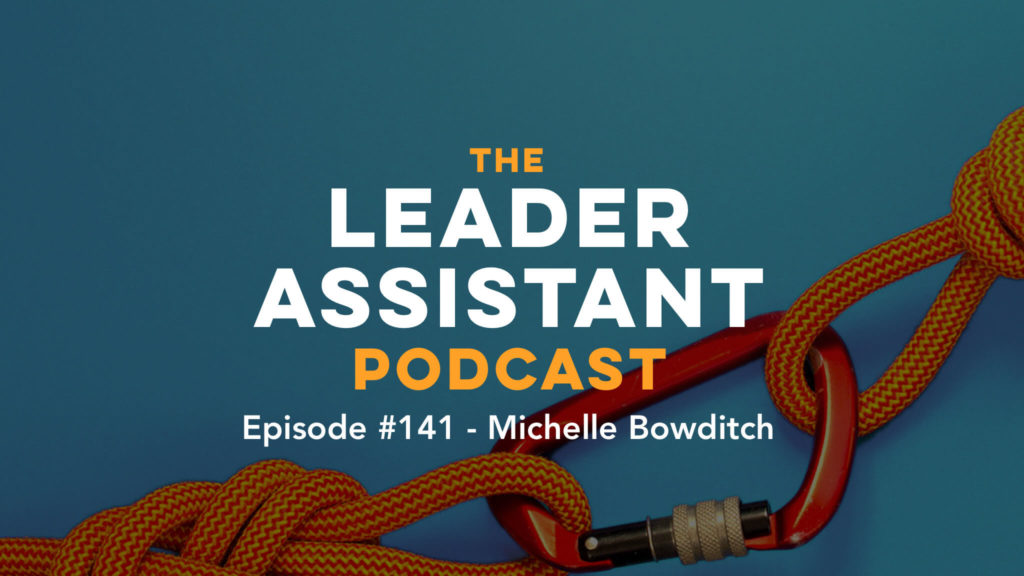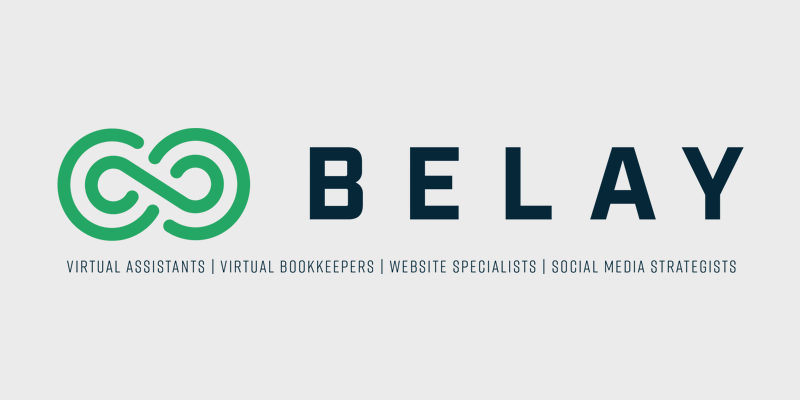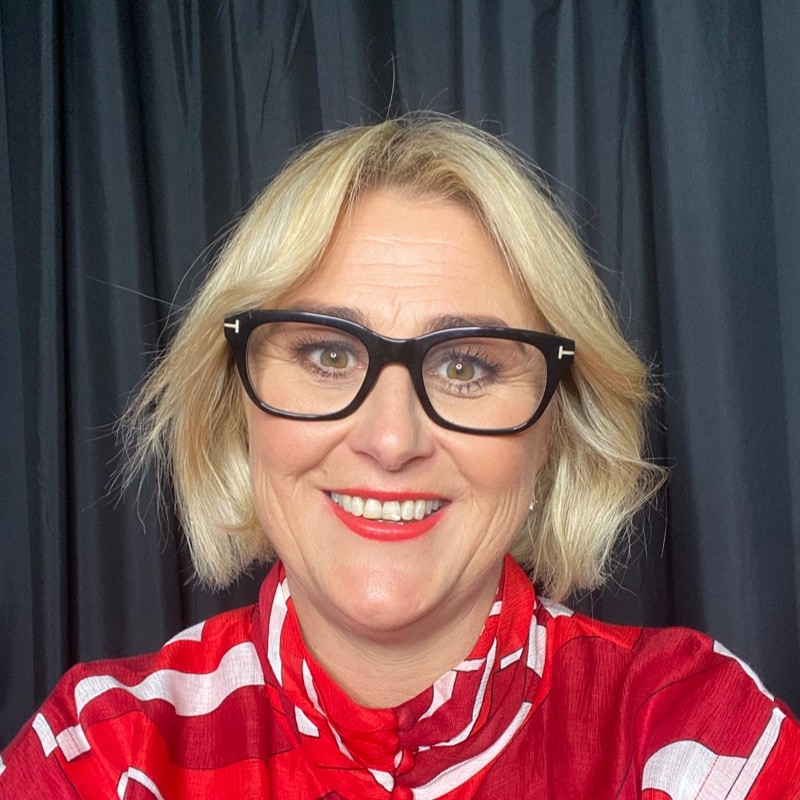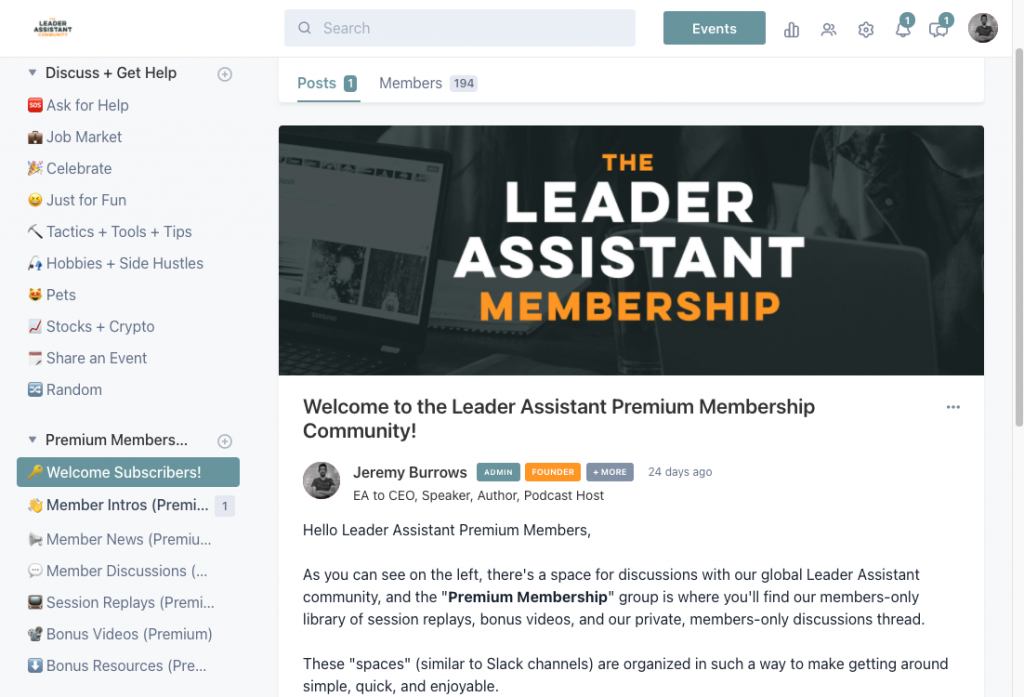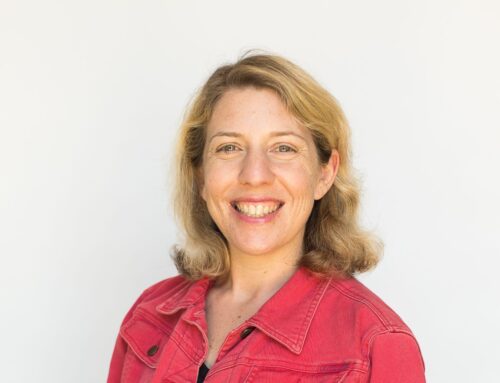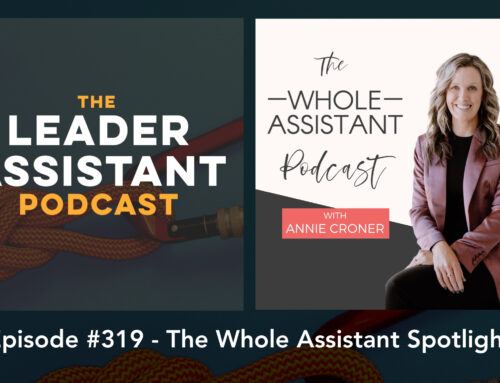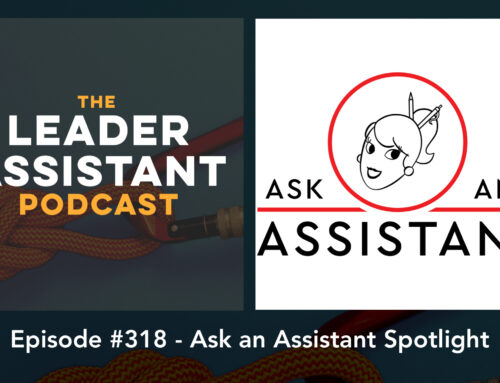Michelle Bowditch has several years of experience as an executive assistant, and also many years of experience managing events. She currently runs Door20a, a tech consulting agency, and recently founded the Australian Admin Awards.
In this episode, Michelle shares her executive assistant career story, and talks about how to anticipate your executive’s needs, the importance of elevating respect and recognition for the assistant profession, and much more. Enjoy our conversation!
CONNECT WITH MICHELLE
- Michelle on LinkedIn
- Door20a on Instagram
- Australian Admin Awards on Instagram
- YouTube – Australian Admin Awards & Door20a
THIS EPISODE’S FEATURED SPONSOR
Work and life don’t have to be so hard. That’s why BELAY wants to make it easy and fun, all while catering to you and your needs because we know you work to live – and not the other way around.
So whether you’re a Virtual Assistant, Bookkeeper, Social Media Strategist or Website Specialist, BELAY has clients right now who need your expertise and insight.
Getting started is easy! Visit BELAY Solutions to learn more.
LEADERSHIP QUOTE
If you’re not a leader on the bench, don’t call yourself a leader on the field. You’re either a leader everywhere or nowhere.
– Abby Wambach
ABOUT MICHELLE
Michelle Bowditch is the founder of Door20a, a tech consulting agency supporting Women in Business and Executive Assistants to accelerate their careers to the next level. Through strategic coaching, she helps professionals amplify their workplace presence, master influence, and road map their ambitions into existence.
THE LEADER ASSISTANT PREMIUM MEMBERSHIP
To learn more about how you can join the now 200+ growth-minded Leader Assistants, check out our Leader Assistant Premium Membership for ongoing training, coaching, and community.
LEADER ASSISTANT LIVE EVENTS
Check out our constantly updated schedule of events for admins and assistants at LeaderAssistantLive.com.
THE LEADER ASSISTANT BOOK
Download the first 3 chapters of The Leader Assistant: Four Pillars of Game-Changing Assistant for FREE here or buy it on Amazon or Audible.
JOIN THE FREE COMMUNITY
Join the Leader Assistant Global Community here, or the Facebook Group here for bonus content and to network with other assistants who are committed to becoming leaders!
SUBSCRIBE
Subscribe to The Leader Assistant Podcast so you don’t miss new episodes!
You can find the show on Apple Podcasts, Spotify, Google Podcasts, Pandora, and Stitcher.
Join my email list here if you want to get an email when a new episode goes live.
LEAVE A REVIEW
If you’re enjoying the podcast, please take 2 minutes to rate and review the show on Apple Podcasts here. Each review helps me stay motivated to keep the show going!
—
EPISODE TRANSCRIPT
Michelle Bowditch 0:00
Hi, I’m Michelle Bowditch and today’s leadership quote comes from Abby Womack. If you’re not a leader on the bench, don’t call yourself a leader on the field. You’re a leader everywhere or nowhere.
Podcast Intro 0:13
The Leader Assistant Podcast exists to encourage and challenge assistants to become confident, Game Changing leader assistant.
Jeremy Burrows 0:26
Howdy friends welcome to The Leader Assistant Podcast, your host Jeremy Burrows and today is episode 141. Very excited to share this interview with Michelle Bowditch but first let me share a quick note from this episode’s sponsor, work and life don’t have to be so hard. That’s why belay wants to make it easy and fun, all while catering to you and your needs. Because we know you work to live and not the other way around. So whether you’re a virtual assistant, a bookkeeper, a social media strategist or a website specialist belay has clients right now who need your expertise and insight. Getting started is easy, visit belaysolutions.com and click on the jobs link in the header. I’ve known the folks at belay for quite a while in fact, I interviewed their co founder, Brian miles in Episode 32 of this podcast, which you can check out at leaderassistant.com/32 So uh, definitely recommend checking out belaysolutions.com, and click on the jobs link in the header. Hey, friends, thanks for tuning in to The Leader Assistant Podcast. This is your host, Jeremy Burrows. And I’m very excited for today’s interview with Michelle Bowditch in the shell. How’s it going?
Michelle Bowditch 1:50
I’m good. Hello from Sydney.
Jeremy Burrows 1:53
Yes, it is. Tomorrow where you are. So it’s nice to talk to someone in the future.
Michelle Bowditch 2:00
Yes, yes. And we are coming out of lockdown. So it’s exciting times for us I was at the manage. Nice.
Jeremy Burrows 2:07
So what let’s just jump right in. So you are the founder of door 20, A, and the Australian admin awards. And we’re gonna get to both of those in a minute. But once you tell us about your career, and then specifically how you became an executive assistant.
Michelle Bowditch 2:25
Yeah, thanks, Jeremy for having me. So I started my career, actually, in the event space. So I was in sports management actually lived in the US for a little while. I come from a golfing family. So you know, navigated the sports world in event management. And then in my late 20s, had to come back to Australia from a family reason and actually got into the wine business, but still in event management. So started my early career in event management, which then kind of led me into the administration professional space. So then in my early 30s, I went through a terrible breakup, and marriage and all broke down and had to reevaluate, you know, being in the event space and working all those long hours. And, you know, had to look at my skill set as to what I had learned, being in the event management space, and didn’t choose to go into the admin EA space, I literally went for a receptionist job, just to kind of navigate me for a period of like three to six months and and literally walked into this guy’s office, he was an entrepreneur, and he said to me, why are you applying for receptionist job, you are so highly skilled, you’re a leader in your own space, I think you can become my EAA. And it was the first time that I actually understood, you know, about creating the magic with the executives that you’re going to support and getting the feet and the trust, right from the first time you met them, meet them. Because the thing is, is that as we know is, you know, in the admin profession, when you’re supporting one or two executives, we have to really have the fit, and we have to get it right from day.so. This gentleman, we he was an entrepreneur, he had multiple businesses, and it was in the finance and wealth management space. So I really I worked with him for a period of just under 10 years. And we navigated, you know, from buying and selling businesses. And then he sent me retired at quite an early age and I found myself in a position going oh, okay, so what do I do now? And then I, I dabbled for about 12 months, still working with entrepreneurs at the CFO and CEO level. And then I took the leap of faith and when I went to a massive big corporate I’m Schneider Electric, and Schneider Electric so they light switches and solar panels. So when it was space that I knew nothing about I went from sports to wine to then, you know, wealth management and accounting and they went to light switches and solar panels and was quite blown away by I think, you know, during that time of working for a founder and entrepreneur, and also, you know, a CEO, there was so much I learned from the personal side, because I was supporting him, you know, from his personal life all the way through to his boardroom table life. And he really gave me the confidence even though I didn’t start off in my early 20s in admin space to really say that it was okay for me to have a voice. Yes, I could ever see that the boardroom table. And we we always worked together collaboratively because of our communication skills, we had to fit right from day job, the trust was there. And then, you know, found myself at Schneider Electric, and went holy Julie, what is this space and you know, the head office is based in France. So, you know, I had to juggle different time zones. And then in 2018, my VP that I was supporting the time, she had the opportunity to go across to Silicon Valley and head up an incubation. And I had no idea what an incubation was, I had never been to Silicon Valley, you know, coming from Sydney, you know, we I dreamed that Silicon Valley was a big San Francisco bridge with beautiful high rises. And I’m sure many of you guys listening have been to Silicon Valley. And it’s totally different. And, you know, the first day I arrived, there went, Oh, my gosh, it’s flat, it’s desert, it’s warehouses, you know, we’re not desert. And I just went, Oh, this is not what I imagined. But, you know, I worked in it, we worked in incubation in in a startup phase. And that was where that was in 2000, beginning of 2018. And that’s where I fell in love with technology, and really understood how having technology in our admin profession can really create those efficiencies can really, you know, allow us to move from being a transactional EA to being a strategic EA, it also allowed me to step up to that next level of leadership, and be seen as a leader heard as a leader, and have that seat at the boardroom table as a leader. So it was just a huge six months, a huge transition in my career. You know, and then we became Eclipse or solar, which is a startup tech business now operating in Australia. So, you know, I stayed in the admin profession until middle of 2019. And then my role was no longer needed. Because in the startup world, you know, C suite EA is not a title that you use, they were really everything they were doing within the business became automated, which is fantastic. You know, we had a virtual CFO of virtual HR and back in 2018, when you say the word virtual CFO, virtual HR people going, who are you? Are you crazy, whereas now a lot of businesses operate like that, because technology has certainly changed the infrastructure in the way we set up a new business. So, you know, fast forward from 2019 to today, you know, I am the founder of door 20, A, which is a tech consulting business, that I work with women in business, and executive assistants. And then I’ve also just recently launched the Australian admin awards. So that’s kind of, you know, woman that’s approaching a 50s. That’s kind of my life. And, you know, what is it a couple minutes, five minutes of what I’ve been doing, but being an assistant, Jeremy, like, I was really lucky. Over the past two years, even though I’ve got my own business, I’ve actually stepped back into the EA role to what I call subbing so, you know, do the high five to someone, someone needed to go on leave. So someone that was in a really high CEO position, they need to go on two or three weeks leave, or they had an emergency. And it was that trust thing, because you know, you just can’t walk in and snap, click your fingers, and you become this high performing EA. So I’ve had the opportunities, which is I’m very grateful to those EAS that are regulars in Michigan, you come and, you know, just tag team for me for a couple of weeks in a setback in the driver’s seat and, and I think for me, it was really good, because, you know, even though I haven’t been sitting in an AAA role for two years now, being able to do that has reminded me how incredible this profession is, and how these individuals are thought leaders and how they are incredible and brings so much value to every organization.
Jeremy Burrows 9:16
Yeah, that’s great. So what was your maybe your number one favorite part about being an assistant?
Michelle Bowditch 9:25
Look, you know, it was funny all my life up until my last job, I had male bosses. So when I went to work for the my last CEO, she was my first female ever. So, you know, I think the the most more The favorite thing about the role was, you know, not one day was ever the same. And I think to be successful, and I use the word successful loosely because everyone can define it in a different way. But for me to enjoy my job, you know, I always had the solution to the problem before the problem occurred. And I think if we can do that, as Executive assistant, oh my gosh, we’re 10 steps ahead of the game. And I think, you know, being in our roles, I’m a people person, and you know, the connection piece that I could have with so many people, you know, from the CEO to a board down to the office manager to the man in the mailroom. I just love chatting to people. And, you know, one of the things is being a leader, as you know, Jeremy is we’re never too old to learn. And we need to learn from everyone. So I just love the connection piece and, and meeting new people every day.
Jeremy Burrows 10:31
Yeah, well, let’s let’s dive a little bit deeper on your point about being 10 steps ahead and just kind of solving the problem before it happens. What’s what’s one, one tip that you would give to those listening who are trying to figure out how to anticipate better?
Michelle Bowditch 10:48
I think don’t overcomplicate things because, you know, sometimes we look at a situation and we have we’ve got like our eyeglass lens on like a narrow lens, and we don’t look outside that lens. And I think for us to be that 10 steps ahead. As you said, we’ve all we’ve got to look at the whole landscape and what’s going on. And I think the thing is, is that you’ve got to do it your way. So when we’re making a decision, or we wanted to change something, don’t do it because Joe Bloggs or the Kardashians have told you that you’ve got to do it’s like with technology, don’t use that technology platform because someone’s told you to do it. I think when we make a decision, or we’ve got to be a step ahead of the game, put ourselves in that position and say, What would Jeremy Burrows do? Or what would Michelle Bowditch do as at, you know, ask yourself, what would you do and react and navigate and make a decision the way that you want to make it because the thing is, is your executive hasn’t chose you, because of something they’ve done, they’ve chosen you because of how amazing you are. So do it your way, stay in your lane, remind yourself how incredible you are. And then you know, when you’re coming up with that solution to that problem before the problem occurs? Are you going to doubt yourself? Yes, you are. But you’ve got to back yourself 110%. Because the thing is, is that that impostor syndrome, we all get it at some, at some time, it comes back into our life, we will double take ourselves when you know these beat person walks into a room with the big title, and he’s the CEO of you know, Fairfax Media or whatever the company is. And we get that we get that thing where it’s like, I can’t do that I can’t talk to this person, I can’t make that decision. We’ve just got to back herself, we’ve got to stay true to who we are. And remember that we are incredible human beings. And the title doesn’t define who we are. It’s the actions that define who we are.
Jeremy Burrows 12:34
Well said well said love it. So okay, so door 20 A is kind of technology, training and consulting is can you tell us a little bit more about why you started that.
Michelle Bowditch 12:47
So the reason that I started is that when I was over in Silicon Valley oversee learned all about technology in my role as an executive assistant. So I met Mr. Zoom and Mr. Slack, which everyone’s using now these days. And when I would would say slack, or zoom in 2018, people looked at me as if it was a foreign word, or was a dirty cup of coffee or something like that. But I was allowed, you know, working in an incubation and working in a space with these incredible, you know, cloud solution architects and data scientists, I before that, never knew what they did or even knew what that title stood for. But these young, incredible, very, super smart men, and I will say men, because you know, 95% of who I worked with, in incubation were men. They, they challenged me and said to me, Mitch, so why are you reconcile it reconciling your CEOs? A mixed statement in concur that way? And I said, Well, there’s no other way to do it. And they said to me, Well, you know, that you can get your Uber app to talk to your Concur app, you know, you can get your cuantas app for your travel to talk to you that you know your booking tables, which is where you book all your restaurants, it can talk to it. And from that moment, I learned how we can integrate information into a platform to create those efficiencies. So when I, you know, took the leap of faith and started door 20 I just wanted to spread the message to all those incredible admins out there to create those efficiencies, and also not to fear technology, because we do fear it with we fear it in two ways we fear it because we think it’s going to take our job. And secondly, we think we fear it because you know, technology, people think of coding these languages in these words that we don’t understand, when in fact, technology does not need to be feared. So really, it was for me just getting out there. You know, something as simple as you know, I worked with a group of EAs at American Express. They were supporting executives who were constantly traveling to the Asia region, hosting conferences would come back with a stack of business cards, and they would men usually sit there and enter the business cards into their contacts as well as their exact contacts. And then they would manually send an email out. Thanks for attending the conference. Here’s your post conference pack. And you know, I showed them a something simple, which was a business card reader app called cam card. And I showed them how to take a picture of your business card, have a prefilled already conference pack post pack, ready to done. And they literally took a photo hit three buttons. And all of a sudden, the person had the post conference pack, the contact was in both theirs and their exact contact box, and it was done. So they went from spending a week of entering business cards and sending out post conference pack to then going back to say, maybe an hour tonight, you know, an hour to 90 minutes of their day. So it’s just that awareness piece of you know, with technology, because as we know, Jeremy with technology, one box doesn’t feel or, and, you know, in a lot of corporate organizations got firewalls, they’ve got restrictions, especially in government. I mean, we’re using Skype today. And that is your platform, that is your tech toolkit, that’s your, that’s your thing that you have in your tech toolkit that works for you. So I say to people, you know, find the tools that suits you, and also suits the platform’s or the organization you’re working in. So if you’re in the Microsoft 365 environment, oh my gosh, there’s so many, like, I call them kids running around in the Microsoft 365 Fair family. And I talked to admins every day that, you know, don’t didn’t know that OneNote existed, you know, the planner existed, didn’t know, they can do a transcript in Microsoft stream. And they’ve got all these tools there. But they haven’t loaded up their tech toolkit to have the right tools to suit them. So I think, you know, the technology space is ever changing, as we both know. But it’s always finding what’s going to suit you and set your executive to work the most effective way and to create those efficiencies, because when you do create efficiencies with technology, it frees up your time, and all of a sudden, you’re going oh my gosh, I can now do that project with my leadership team. Oh, my gosh, I can now go to that board meeting because I don’t have to sit there and reconcile expenses, oh, my gosh, I can do all these other things. I can go on training, I can learn more. And I think that’s what we need to overcome. We need to overcome the fear that technology is there to help us not hinder us.
Jeremy Burrows 17:20
Yeah, you know, speaking of Skype, I think another point would be to caveat to yours would be like, you know, you gotta find the tools that work for you. And sometimes, like, I don’t even like Skype to be honest with you, like I that’s not the best platform ever. However, I’ve used a few different tools to record podcast interviews, and for whatever reason, Skype has the most crisp and clear audio for my podcast. And so like, Whatever, whatever it is, I don’t even really understand it, I just know that it sounds a lot better than if I record a zoom call. And so anyway, my point is, there are tools that you know, will work, and then there are tools that will work better for your specific needs. So don’t be afraid to try different things. To save yourself time.
Michelle Bowditch 18:16
Yeah, and I can’t agree even more, and I’m sure that Skype, this is the thing is you’ve chosen to use Skype for those reasons. And I’m sure that it also integrates well into the other platforms that you’ve then got to go out and upload your podcast on. And I think we as assistants need to think of that, you know, what is the outcome we’re trying to achieve? Don’t say I need to use Skype, look at the outcome, the outcome you’re trying to achieve at the end, like what’s the end result, and then work backwards. And when you work backwards, then you can load up your check toolkit with the right tools. And you know, you might use Skype for your podcasts. And then you’re using Google Docs that everything else. So it’s kind of working out what sits for you. And I think we get confused as admins because we have so much choice now with technology. And we go well, you know that he or she is using bass, I need to get involved in bass or she’s using slack. And you know, and then they join up to Slack and they never use it and they never create these efficiencies. They don’t maximize a platform. And that’s when they get frustrated with technology.
Jeremy Burrows 19:18
Awesome. Well, speaking of technology, what are two of your favorite tech tools right now?
Michelle Bowditch 19:26
Oh, okay. So obviously, I’m a business owner. So zero is my favorite at the moment, because it’s my accounting software platform. It is a global tool. It works so efficiently, both on my phone and my desktop. And any business owner that’s listening. You know, you’ve got to know your numbers in business. So that’s my favorite one at the moment. My other one I’ve got back into Slack. I’ve moved off Facebook. I recently had a Facebook pause and I’ve joined all these incredible slack communities. And I just find the conversation going on in Slack at the moment. The admin and communities really finally got it. And instead of thinking that they’ve got to sit there and write an essay, they’ve turned it into a fun, creative, connected platform. So I’m enjoying slack again. And you know, as I said, I use it in 2018, from a project management tool, but now I’m using it from a community based connection platform.
Jeremy Burrows 20:20
Nice. And it’s changed a lot since 2018. So
Michelle Bowditch 20:23
I’ve got the emoji, like, I just love the emojis because someone allows him to do something, and you’re popping emoji and, and someone will say, what does that emoji mean? And then, you know, creates a bit of fun and laughter. And I think it takes, you know, you’ve got to take the seriousness sometimes out of your job and have more fun and joy.
Jeremy Burrows 20:41
Yeah. All right. Well, let’s transition to the Australian admin awards. Why? Why awards? Why did you decide to start this?
Michelle Bowditch 20:54
So you know, I, you know, I’m a massive advocate for advocate for our profession, I truly love the value that all of the administrative community brings to any organization from the receptionist all the way up to the EA, chief of staff, I mean, 2020, in Australia, we saw the admin profession just be hit so hard, like the job, the jobs within the admin space, they were the first to be cut. So we had a huge influx of job losses last year in the admin profession. And then I obviously went on my little path and wrote some research papers. And then we kind of started 2021, you know, with a bit of a bang, we got a little bit back to normal and life. And we started to see the the change in the positioning of admin jobs that, you know, the way they were being advertised, but we still weren’t there. And then the donor strain hit Australia, and then we went into crazy lockdown. And we and we kind of, we were going back to that job loss thing. Again, we were, you know, people being stood down, you know, they weren’t being maybe done. And I kind of was watching the joy being lost in a lot of the admin profession. And I’m going, we need to celebrate these guys more. You know, in Australia, we’ve got the reo Awards, which is the big future Music Awards. And I literally were six weeks now, literally six weeks ago, woke up in the middle of the night and went right, I need to bring joy back to this profession. I need people to celebrate and recognize all these unsung heroes that have, you know, done incredible things. And I said, I want to create the ARIA awards for the admin space here in Australia. So literally six, you know, four weeks from the day I woke up in the middle of the night, we’ve launched it, we’ve created an amazing platform, there isn’t an award and awards platform in Australia that celebrates everyone. It’s not based on your title. It’s based on your skills, superpowers, and the tasks that you’re doing the job. And I think sometimes we do get, we get lost in in the title. And we forget what we’re actually doing, and the value we’re bringing to the organization. And you know, like I think of the office managers here in Australia, like they’ve gone from packing the photocopier every day and feeling the tea canisters to now writing COVID safe plans rolling out Microsoft Teams platforms. And you just go holy moly, these women are truly incredible. And I do say women, because 96% of the admin community in Australia are females, I’d like to see more men. But that’s another conversation we could have on a different date, Jeremy, but we’ve just got to go. There’s nothing I mean, we’ve got a few other small businesses celebrating particular titles and particular parts of the admin space, but there’s nothing celebrating the whole of the admin space. So we’ve come up with nine amazing categories, you know, I had to sleep slot in that tech tamer Award, which is in there. So we’ve got a tick time award. We’ve got visionary. We’ve got Community Awards, we’ve got, you know, first impressions awards, and people come back to me and say to me, Mitch, can an admin be a visionary person? Can they be a community leader, and I go, how they can be one of those. They’re all just because they’re in the admin space doesn’t stop, stop them from being incredible human beings. So the Nominations are open. Now we’ve got another, I think, four weeks of nominations. And then in January, we’re going to have a proper big black tie gala event here in Sydney face to face. We’re flying all the finest finalists from around Australia and, Jeremy, we need to celebrate our professional because the value and you know this the value that these individuals bring to, you know, a small startup business to a massive corporate is just incredible.
Jeremy Burrows 24:23
Yeah, so do you have any stories you could share about maybe how an award or winning an award has directly benefited an assistant that you know?
Michelle Bowditch 24:35
Yeah, so it was interesting. I just I caught up with Justin Barwick on LinkedIn live and I’ve shared it in LinkedIn if everyone wants to look at it, so Justin Barwick, he was an EA and in 2018, and 2019. He nominated himself for EA of the Year at the CEO magazine and I absolutely love this that the CEO mag Same they have one award for EAS. And what he did is there’s a couple of things that he said that happened with that in the interview is that he went from being a transactional executive assistant that slightly had a voice and slightly had a seat at the boardroom table. To then first of all, when he was nominated the first year, like he had this huge leap of confidence, he, you know, he had, the way that he approached his job, the following year was just totally different. The outlook was totally different. And then when he went and won EA of the year to the CEO, in 2019, he just went, Oh, my gosh, I’m now a strategic business partner, I now have a voice, I’m now going to sit at the boardroom table. And he’s leadership, you know, being a leader, he was now actually acknowledged as a leader, whereas before, he wasn’t. And like you said in the interview yesterday, one of the other big things was Is he also transitioned from the title of executive assistant to executive business partner. And it was an easy transition, he’d wanted to change his title before, but didn’t know how or didn’t know how to start the conversation. He did change industries, and also who was supporting. So it was an easier transition. But he said, by being nominated for an award, just the accolades that you get from that, and their self confidence, and you know, and it also changed the conversations, when he was going to do his annual review, or he was sitting down and writing his KPIs. Because the dream that he wanted to dream big actually become a reality. So, you know, life isn’t always about winning all the time. I think it’s, you know, cheering yourself on in times when you doubt yourself when the imposter syndrome comes in. And you know, just to be nominated, like, I’m reading some of these nominations at the moment. And like, we’ve had a doctor nominate his receptionist at the doctor’s practice. And right, he was writing about, you know, what happened during the COVID, you know, when they had to stop seeing customers face to face, and they had to go to telehealth, and then the vaccines came in. And just the navigation piece that she had to deal with from an emotional level. I just go holy moly, she’s incredible, because you can imagine, she got abused because people couldn’t get their vaccines. And then, you know, people constantly grumpy because they couldn’t come and see the doctor anymore. And but this human being like we put them, we define them by their title, when in fact, they’re amazing leaders already in their own right. And we forget about that. So I think this is the thing is, it’s a great reminder for everyone that is thinking of, it doesn’t matter whether it’s Australian admin awards, or the American admin awards, or whatever awards platform you do. It’s about a celebration piece. And, you know, one thing I want to say also to your listeners, while we’re here is, if you guys don’t have a brag book, at the moment, go and start a brag book. Now Bradbrook is something that you collate over the 12 month period. And you’ve got to writing that brag book, use small wins, and your big wins. If someone sends you an email and says, Jeremy, you’re friggin amazing what you did with that event today, you know, the way you spoke to put that in your brag book, if a client rings you and tells you something beautiful about you write that in your brag book, because when you go to the end of the year, whether you get nominated for an award, or you’ve got to sit down with your manager and executive. And they asked, What did you achieve in the last 12 months? You go, tada, here’s my brag book. And this is what this is how awesome I am. And this is what I achieved.
Jeremy Burrows 28:28
So you kind of answered my next question in this because you know, an award or an a nomination for an award doesn’t make somebody a leader. But recognizing them and highlighting and spotlighting their leadership skills is what you’re all about sounds like which is awesome. So what does make an assistant a leader and I know you kind of already answered this, but I’m gonna directly ask you what makes an assistant a leader.
Michelle Bowditch 28:57
I don’t believe the title makes you a leader. I believe your actions make you a leader. So, you know, it’s the way that I mean, we live life gives us leadership skills. I honestly believe I don’t believe that you can wake up one day and click your fingers and become a leader. I mean, life teaches us leadership skills. So I think if we focus on, you know, honing in on our strengths, what are your strengths, what are your weaknesses, and if you’ve got weaknesses, which we all do, go out and either, you know, learn, grow, educate in those weaknesses, or of the weaknesses that you do have. outsource it. So for me my business like, you know, everyone knows that I suck at English and you know, I’m a terrible writer. So I have to outsource that skill because I’m not good at it. I tried to be good at it, but I’m not good at. And it’s that acknowledgement piece because we always have times where as leaders, you know, I teach my children to lead by example, in the way I behave, you know, admit your mistakes and own up to being And I think that’s a part of that action bit Jeremy, you know, title doesn’t make you a good leader your actions do.
Jeremy Burrows 30:07
Love it. Well said and Michelle, thank you so much for taking a few minutes to share a little bit about your story and your passion for the executive assistant community. How can people reach out and connect with you and say hi and find out more about what you’re up to?
Speaker 1 30:24
Yeah, either on LinkedIn or Instagram is probably the best way. I’m Michelle Bowditch on LinkedIn or my instagram handle is door20A. Otherwise the websites we’ve got two websites australianassemblyofadministrators.com or door20a.com. So, you know, I love connecting with people. So don’t don’t look at my title and be scared away. Drop me a DM, send me your audio voice message. I love audio messages, by the way. So yeah, LinkedIn or Instagram are the best platforms.
Jeremy Burrows 30:55
Perfect. And I’ll put those in the show notes so people can find you easily and yeah, thanks again, from the other side of the world, and hope you have fun in the future and we’ll hopefully meet in person someday.
Michelle Bowditch 31:10
Amazing. Yeah. And thank you for all your listeners as well for listening today. Have a great day Jeremy.
Jeremy Burrows 31:15
Thanks, Michelle, and thanks for listening. I hope you have a great week. Be sure to check out the show notes at leaderassistant.com/141.
Speaker 2 31:35
Please, when you are on Apple podcasts goburrows.com

